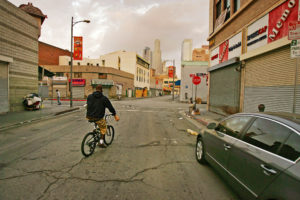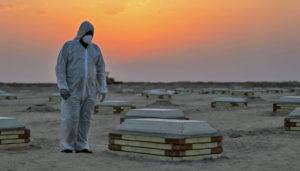I backed into a spot where I could watch both entrances of the Papa Johns Pizza parking lot, punctual for my rendezvous. To be safe, I had first taken a slow cruise through the lot, on the lookout for the telltale signs of an unmarked police car. I was here to meet someone I knew only as Smog Lady. Adam, the night manager at Autozone had given me her telephone number. Word on the street was that Smog Lady could get me a smog certificate, and thereby cut the Gordian knot of the California Department of Motor Vehicles bureaucracy.
I grew up in California, moved away in the early Nineties, and moved back in 2019. One of the new things I noticed upon my return was small signs stuck to the side of a car, or printed on posterboard and erected on a street corner, advertising “DMV services”. After some intercourse with a few of these, always conducted in halting, heavily accented English, I came to understand that these entrepreneurs are “fixers”, a species that most Americans are unacquainted with. If you want to get something done in the developing world, you often need to engage the services of a fixer. This is someone who has connections in the bureaucracy, often by virtue of kinship. Being a naïve visitor without connections, you couldn’t possibly know whom to bribe, how to approach them, or what forms must be observed. These things must be accomplished with delicacy. You, brainwashed to believe in the Weberian version of bureaucracy as impersonal rationality, are too naive to navigate a real one in most parts of the world. Too European.
They say California is the future. However that may be, the state has become more like the rest of the world, less like the erstwhile United States. The old European ways of procedure-following are anomalous, and perhaps never made a lot of sense. Or maybe they made sense only within a framework provided by something like Calvinism, Prussian organisation, ecclesiastical administration, or some similarly ascetic institutional morality that is “no respecter of persons”. By contrast, ties of kinship are easy to grasp, more robust, and make sense to more of the world’s peoples as the ground of cooperation, particularly in societies where the clan may be as far as trust extends.
I was very happy to have found my way to Smog Lady. I spotted her 20 minutes after I arrived at the parking lot. She was making her rounds, leaning into cars through the driver’s side window. Finally she approached me: a toothless matron who spoke only Chinese beyond a few key words in English such as “odometer” and “VIN number”. I noticed she had a large wad of cash in her hand. I gave her my $200. She then got in her car and drove out of the parking lot. I had a moment of panic, thinking I had just been ripped off. But sure enough, 30 minutes later she came back with my fraudulent smog certificate.
The Berkeley historian Yuri Slezkine coined the term “service nomads” for distinct peoples, typically itinerant or diaspora, who perform functions within a society that can only be done by outsiders. That is because these functions, though indispensable, are shady in one way or another and can’t be openly avowed as necessary. Things such as usury (that is, providing credit), burying the dead, magic, puppeteering, prostitution, peddling, cobbling, knife sharpening, dispute mediation and all manner of border-crossing and go-between work that allows the principals to negotiate without losing face or being compromised.
Every society has such liminal populations (gypsies, Jains, Travellers, the “overseas Chinese,” the Sheikh Mohammadi of eastern Afghanistan) who develop some kind of “transgressor expertise”. They must keep themselves apart, as integration into the bonds of reciprocity and communal honour would make their trade impossible. As Slezkine lays out: they are regarded as unclean, and in turn they guard their own purity against contamination by the host population, from intermarriage, say, or simply by accepting hospitality from them. Dietary restrictions and other taboos of self-segregation serve to keep the boundary intact. They speak their own language, and may pretend not to understand the host language.
At first blush, the providers of DMV services appear to fit Slezkine’s description of “service nomads”. But that concept only makes sense when framed against a surrounding society that is settled and cohesive, with taken-for-granted norms that secure a basic solidarity among the host population. Without such a background of belonging, and therefore communal honour to uphold, there would seem to be no need for a separate population and social type invested in transgressor expertise. California has become a polyglot of unrelated diasporas, opportunity-seekers, guest workers, tech Brahmins and multiple-passport-holding functionaries posted to the Pacific Rim economic zone. It is more like the bar scene in Star Wars than like Tolkien’s Shire. We are all wanderers.
I think Smog Lady is not to be understood as a service nomad, then. Rather, the necessity of her services may be taken as an indication of the direction that state bureaucracy takes under conditions of multiculturalism (think Brazil), particularly in the absence of partisan political competition (think Soviet Union). These two features, multiculturalism and political monopoly, interact in interesting ways.
With the collapse of the Republican Party in California, there soon emerged a political landscape resembling what the Yugoslav Communist official (turned dissident) Milovan Djilas termed the “party-state”. That is to say, there is little meaningful distinction to be made between the government and the Democratic Party. Competition for control of California takes place, not between two rival parties with different political visions and corresponding electorates in a general election, but between aspirants within the Democratic Party, under a shared political vision. In practice, this means competition for money from organised interests that fund the activist networks, which in turn translate those interests into various moralisms and thereby shape the vision of the party. The electorate largely drops out of consideration as a constituency.
Only what happens within the Party matters. In Yugoslavia in the Fifties that meant the deliberations of the “political forums”. In California, what happens within the Party is mostly determined by NGOs and foundations, public sector union leadership, expert bodies willing to generate Science in support of the Party’s program, and tech firms that are permitted unlimited capital accumulation on condition of alignment with the Party. Together these entities make up a sort of government-by-cabinet that is effectively insulated from the pressures of electoral politics. The citizenry isn’t feared.
In 2018, there was a rash of news stories about five and six hour waits at the DMV. Newspapers published DMV survival guides recommending that supplicants bring chairs, snacks and backup batteries for their devices. A state auditor’s report found a third of DMV employees not showing up for work on time. At least one data specialist slept for hours every day, year after year, without being fired, and this resulted in serious backups in the work flow.
When I returned to the state in 2019, I put off the transfer of my vehicles (I have a lot of them) and driver’s licence to California for as long as I could, knowing the rigours and uncertainties that awaited me in the attempt. Just as I was beginning the process, in March 2020, the state of California shut down.
Covid turned out to be a godsend for the DMV. On March 26, 2020 the Los Angeles Times acknowledged what those of us in bureaucratic limbo already knew: “To slow the spread of COVID-19, the California Department of Motor Vehicles has dramatically restricted customer visits to its field offices, barring people who do not have appointments and warning that no new slots to appear in person are currently available.” Now there were no lines and, more important, no embarrassing news stories about queues. Problem solved.
To the party-state, citizens with their unending needs are a nuisance. The DMV remained “open” because it is an essential service, but presumably this was less for public safety on the roads than for reasons of the sort that came to light in Knox v SEIU, a Supreme Court case which found that the public employee union (which DMV workers were required to join as a condition of employment) in California had “improperly charged increased dues that went towards political spending”. Those dues from DMV workers were the essential thing, to the party-state.
Several months later, as the pandemic meandered around the globe according to its own logic (in which the only perceptible correlation that emerged between lockdowns and Covid deaths was an embarrassing one), I succeeded in getting in the door of the DMV. To secure a California driver’s licence, I did not have to take a written exam, nor was there a driving test. The DMV had quietly waived these tests. The LA Times quoted an anonymous employee who wondered, “They’re saying we’re being kept open because we’re an essential part of the community… How can we be essential when we’re not protecting the public? We’re putting the public in danger by doing this.” When the same employee raised concerns with her manager about granting licences to customers who’d failed their tests multiple times, she was told, “Nope, just give them their license.” One DMV employee in the San Joaquin Valley reported her office waiving about half a dozen tests in one week, including for people who had been cited for driving under the influence.
In dropping the pretence of its ostensible mission of public safety, the official DMV was perhaps just acknowledging the reality of the unofficial DMV, the one that is likely to be called “corrupt” by people clinging to first-world norms. Having now spent some time in DMV offices in the new California, my impression is that the shop floor operates along the lines of ethnic fiefdoms that overlap somewhat, and work fairly smoothly together when necessary. The Hispanic customers speak their own language with a Hispanic teller, the warm tones and easy gestures of which seem very unlike the bureaucratic mode of address that institutional English is adapted to. There are other languages spoken as well, each with its own characteristic emotional repertoire, and some of these seem better adapted to the haggle — at least to the naïve and suspicious ear of one feeling beset by a cacophonous Babel.
The occasional appearance of an unaffiliated Anglo-American such as myself is accommodated easily enough, and in such cases tellers are able to code-switch into officialese. But one does wonder if one is being offered quite the same menu of services as those who can make appeal to one of these fiefdoms. In 2021, five employees at a DMV office in the Los Angeles area pled guilty to taking weekly cash bribes to process drivers licences for unqualified drivers. According to ringleader Atanacio Villegas, a licence registration examiner in Torrance from 2010 to 2016, “a network of ‘brokers’ would contact him on behalf of drivers who could not pass their driver exams”, and then forward the drivers’ bribes to DMV employees. The scheme involved sending the drivers to the window of a participating DMV employee who had an “identifier”, such as a red hat, as reported in the Press Democrat and LA Times.
In 2022, the Department of Justice indicted 20 California DMV employees who “helped put unqualified commercial drivers who operated large commercial vehicles on highways despite the drivers not passing their written and driving tests”. Employees would accept bribes to enter fraudulent scores for those who did not pass their tests and in some cases had not even taken the test. Various trucking schools looked for DMV employees that they could bribe so students that failed or were unqualified could get their licences. According to the DOJ, “hundreds of fraudulent commercial driver license permits and licenses were issued as a part of these schemes”. Meanwhile, according to NBC, in 2018 down in Corona (near San Diego), Jose Cruz admitted to a years-long arrangement in which “he and other conspirators obtained genuine Social Security numbers of Puerto Rican residents to be sold to people wishing to obtain state identification cards and driver’s licenses, according to his plea deal”.
In a case stretching from 2013-18, various trucking schools in the Salinas area were finding their own work-arounds. “Truck school owner Pavittar Singh was sentenced to prison for paying DMV employees for fraudulent passing scores,” reported The Californian. Meanwhile, “Kulwinder Dosanjh Singh, a broker, pleaded guilty to conspiracy to commit bribery and identify fraud.” Here “broker” refers to a provider of DMV services.
From the perspective of the party-state, presumably the problem with allowing corruption within the bureaucracy is that the thriving business done by these operations represents a lost revenue stream for the union, that is, for the war chest of the Party. In 2014, the California DMV went on a massive hiring blitz, adding a thousand new workers for the express purpose of providing drivers licences to illegal immigrants, per state bill AB 60. “For us, it’s more of a social justice thing,” said Ted Burnett, state-wide coordinator for Service Employees International Union Local 1000.
You, tender reader, might be scandalised by the ways of California’s DMV, but such a response is a hangover from another era. Under conditions of bureaucratic dysfunction typical of a party-state, corruption isn’t a problem, it is the solution. These new populations have found ways to get things done. Bribery is more efficient (and far less crazy-making) than clinging to first-world expectations in a world that has changed. For my part, I am sincerely grateful for the services of Smog Lady. Diversity is our strength.
Disclaimer
Some of the posts we share are controversial and we do not necessarily agree with them in the whole extend. Sometimes we agree with the content or part of it but we do not agree with the narration or language. Nevertheless we find them somehow interesting, valuable and/or informative or we share them, because we strongly believe in freedom of speech, free press and journalism. We strongly encourage you to have a critical approach to all the content, do your own research and analysis to build your own opinion.
We would be glad to have your feedback.
Source: UnHerd Read the original article here: https://unherd.com/




